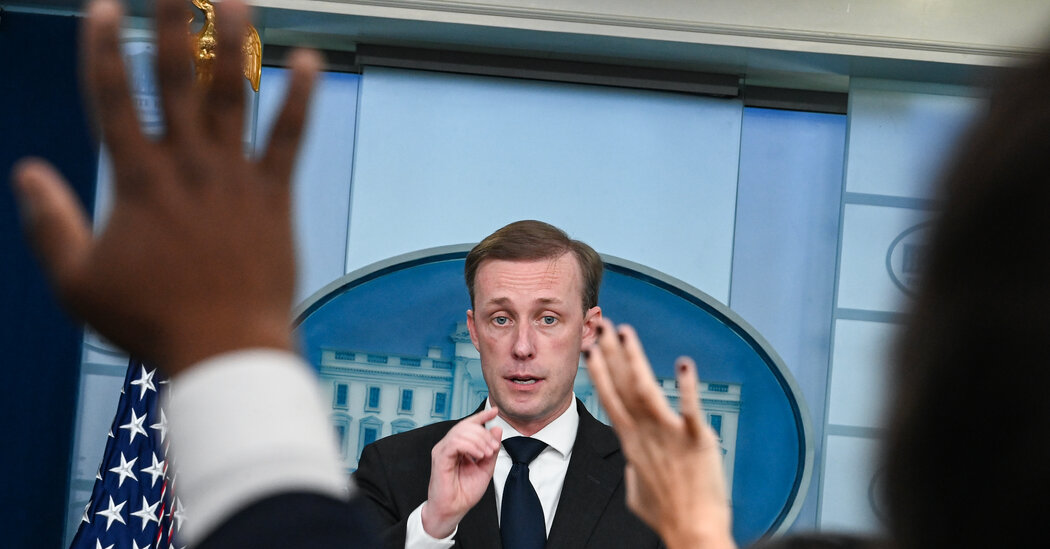President Biden’s envoys are pushing ahead with their effort to realign Middle East politics by brokering the establishment of diplomatic relations be
President Biden’s envoys are pushing ahead with their effort to realign Middle East politics by brokering the establishment of diplomatic relations between Saudi Arabia and Israel despite significant concessions demanded by the Saudi monarchy.
Mr. Biden sent Jake Sullivan, his national security adviser, back to Saudi Arabia in recent days, his second trip there in less than three months, as U.S. officials test the ground for an agreement bringing together two historic adversaries and fundamentally reshaping the region.
No breakthrough was announced, but the fact that Mr. Sullivan returned to the kingdom so soon after his last trip in May suggested that the Biden administration sees serious prospects for an accord. Among the hurdles has been Saudi insistence on American help to develop a civilian nuclear program in which the kingdom would enrich its own uranium, long a fear of officials pursuing nonproliferation.
A summary of the meeting in a White House statement afterward gave little indication of how much progress was made during the visit. Mr. Sullivan traveled to Jeddah, the statement said, “to discuss bilateral and regional matters, including initiatives to advance a common vision for a more peaceful, secure, prosperous, and stable Middle East region interconnected with the world.”
But in a conversation last week with Thomas L. Friedman, the New York Times columnist, Mr. Biden described a possible deal with many moving parts, any of which could easily trip up such a complicated negotiation but would have far-reaching implications if they were resolved.
Among other things, the Saudis are pressing for a NATO-level mutual security pact with the United States, long a taboo among American policymakers who do not want to be committed to coming to the defense of a nondemocratic monarchy if it were attacked. Saudi Arabia, like Israel, worries about Iranian hostility.
The Saudis also want access to sophisticated American weapons, including the Terminal High Altitude Area Defense antiballistic missile defense system, known as THAAD. And they want Israel to take steps to preserve the possibility of a two-state solution to resolve the long-running conflict with the Palestinians.
The American side is pushing for the Saudis to ensure a permanent end to the fighting in next-door Yemen, cementing a temporary cease-fire that took hold last year; to provide extensive new aid to Palestinian institutions in the West Bank; and to curb its newfound relationship with China, which last year played host to talks that restored diplomatic relations between Saudi Arabia and Iran.
It was not entirely clear what conditions to which Israel would have to agree, but Mr. Friedman floated ideas like a permanent commitment not to annex the West Bank and limits on future settlements. The negotiations come at a time of friction between the United States and Israel as Prime Minister Benjamin Netanyahu pushes through legislation to curb judicial authority in defiance of Mr. Biden and hundreds of thousands of protesters in the streets.
Formal diplomatic relations between Israel and Saudi Arabia, however, would be a major victory for Mr. Netanyahu in his long-running efforts to normalize his country’s position in a neighborhood that has been hostile for most of Israel’s 75-year history. The Abraham Accords brokered by President Donald J. Trump’s administration in 2020 opened the door to a changed region when the United Arab Emirates, Bahrain and Morocco agreed to open formal relations with Israel.
Saudi Arabia resisted joining the accords at the time and has been the big prize ever since. The Saudis and Israelis have grown informally closer over the years out of shared fears about Iran’s role in the region, and incremental changes have demonstrated their evolving ties, such as Saudi permission for flights heading to and from Israel to cross the kingdom’s airspace.
Trump administration officials told their incoming Biden counterparts that Saudi Arabia was open to joining the Abraham Accords, though the new arrivals at the White House were initially wary.
But during Mr. Sullivan’s visit in May, Crown Prince Mohammed bin Salman, the prime minister and de facto ruler of the kingdom, expressed more willingness to make a deal opening ties with Israel, and Mr. Biden decided to make a full-bore effort. Secretary of State Antony J. Blinken made a trip to Saudi Arabia in June, followed by Mr. Sullivan’s return.
During his visit to Jeddah on Thursday, Mr. Sullivan was joined by Brett McGurk, the White House coordinator of Middle East policy, who has strong relations with the Saudis, and Amos J. Hochstein, an energy and investment adviser to the president with a long history in the region as well.
They met with Prince Mohammed and other Saudi officials. Prince Mohammed was deemed by the C.I.A. to be responsible for the Saudi operation that killed and dismembered Jamal Khashoggi, a Saudi columnist for The Washington Post and Virginia resident, in 2018. (Prince Mohammed has denied any role in what he described as a rogue operation.)
But Mr. Biden has long since set aside his 2020 campaign pledge to make Saudi Arabia a “pariah” over the brutal murder and his vow last year to impose “consequences” on the kingdom for cutting oil production while gas prices were on the rise in America. Instead, he has concluded that strong ties with the energy power are too important to jeopardize, with the Iranian threat looming and China increasing its influence in the Middle East.
www.nytimes.com
